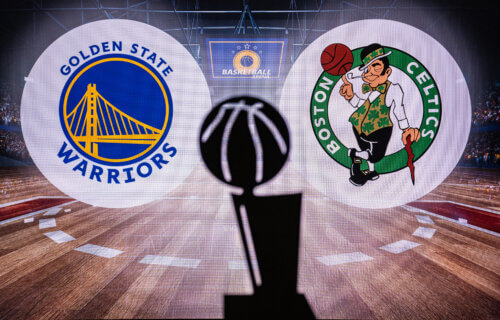MELBOURNE, Australia — The Golden State Warriors are your 2022 NBA champions. The result of game six was a heartbreaker for the city of Boston and their beloved Celtics, but new research suggests the 2022 NBA finals may not have been competed on a level playing field. What are we talking about here? An unlikely culprit: Jet lag.
That’s right, scientists at Monash University say jet lag put the Boston Celtics at a distinct disadvantage during homes games in this year’s NBA Finals. After studying the impact of travel-related jet lag on NBA performances, researchers argue that the effect of jet lag on athletes’ performances is “significant.”
Study authors posit that the NBA (and other major sports leagues) should account for jet lag whenever a pro team must travel long distances across multiple time zones in a short period of time.
“NBA teams are often exposed to jet lag due to frequent travel across multiple time zones, with some teams being disproportionately affected based on their geographical location traveling eastward could be of particular concern to teams located on the east coast who have to travel back to play home games without adequate recovery time,” says senior study author Dr. Elise Facer-Childs, from the Monash University Turner Institute for Brain and Mental Health in Melbourne, in a statement.
“Eastward travel—where the destination time is later than the origin time—requires the athlete to shorten their day (known as a phase advance). During phase advance, athletes often struggle to fall asleep at an earlier bedtime, leading to sleep loss and, consequently, potential impaired physiological performance and motivation the next day,” she adds. “Schedulers could mitigate these effects by compensating eastward travel with increased recovery time to allow athletes to resynchronize to the new time zone.”
To research this topic, researchers analyzed data from 11,481 NBA games played over 10 seasons (2011-2012 to 2020-2021). That analysis led to the observation that eastward (but not westward) jet lag is clearly associated with impaired performances among the home (but not away) teams.
More specifically, in comparison to home teams with no jet lag, home teams that had just traveled eastward and felt jet lagged displayed a:
- 6.03% lower chance of winning
- Lower points differential by 1.29 points
- Lower rebounding differential by 1.29 rebounds
- Lower effective goal percentage by 1.2 per cent
Notably, as player jet lag increased, so did the negative impact on their game. While playing with one hour’s worth of eastward jet lag (San Francisco to Boston with only 2 recovery days), home team point differentials declined by 0.72 points. Meanwhile, two hours of eastward jet lag led to home team point differentials dropping by 4.53 points.
Proper rest and recovery nullifies this issue. Study authors note that when players are afforded enough time to recover post-flight, their performances are quite similar to when they did not travel at all.
“Allowing time for the circadian system to realign naturally to the destination’s light-dark cycle could, therefore, mitigate the observed eastward travel disadvantage,” Dr. Facer-Childs explains.
What if a schedule can’t be changed to ensure all players get enough recovery time? Researchers suggest team doctors and sleep specialists employ any number of evidence-based interventions to help combat jet lag. Examples include specifically-timed light exposure and avoidance or melatonin supplements.
NBA jet leg controversy is nothing new
This isn’t the first time jet lag has come up within the context of the NBA. Jet lag was a hot topic around the NBA in 1980s. Why? The league was dominated that decade by Larry Bird’s Boston Celtics and Magic Johnson’s Los Angeles Lakers; two teams at opposite ends of the country. In 1985, the NBA decided to change the Finals schedule to a 2-3-2 format (Games 1, 2, 6, and 7 are played in the higher seed’s city while games 3, 4, and 5 are played in the lower seed’s city) in an attempt to minimize travel time among players.
But, in 2014, the NBA switched the Finals schedule back to a 2-2-1-1-1 format. The justification for this move was that all modern NBA teams travel privately nowadays, making travel in general less arduous.
“However, while private jets can make cross-country flights less cumbersome for players, they do not protect against circadian disruption caused by crossing multiple time zones (i.e., jet lag), especially when teams are not given sufficient time to adapt to the new destination’s 24-hour environment (approximately 1 hour per day),” comments first study author Josh Leota.
This study was released before the Warriors won the 2022 NBA title, but study authors theorized at the time that the Celtics may deal with some jet lag.
“According to the 2022 NBA Finals schedule, the Boston Celtics will be playing home games 3 and 6 with the possibility of 1 hr eastward jet lag,” they wrote. “In this particular case, the Boston Celtics might benefit from chronobiology-informed strategies designed to mitigate eastward jet lag symptomatology and maximize competitive success. We note that we did not analyze playoff games in our study. It is plausible that the increased stakes of the post season likely have already led teams that are returning home to forgo social commitments in favor of game preparation and circadian resynchronization.
“Our data show that, during the regular season, home (but not away) teams playing with eastward jet lag are particularly disadvantaged. We speculate that away teams aren’t as impacted due to the controlled environment of traveling NBA teams. Team management can mitigate jet lag effects by maintaining a structured schedule (e.g., transportation, meal timings, athlete treatment sessions, and trainings) while on the road compared to when athletes travel to their individual homes and attend to familial and social obligations.”
The study is published in Frontiers in Physiology.
